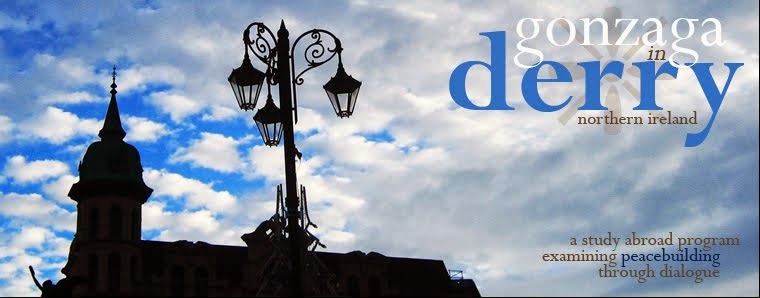
By Sophia Iliakis Doherty
At midday on January 11, 1974, the sound of a bomb blast echoed through the Derry winter sky. Not an uncommon occurrence during a highly turbulent time in the famous city’s history. As life momentarily paused, the citizens of Derry were left to wonder ‘who’ just lost a loved one. How many lives would be forever impacted by that familiar deadly sound that instantaneously halts hearts for only seconds?
.JPG) Yesterday, Saturday, January 11, 2014, the Derry Journal highlighted this story marking the 40-year anniversary of that fatal day. John Dunn, a 46-year-old husband and father of six and Cecilia Byrne, a 53-year-old wife and fellow worker at the British barracks at Ebrington became two of hundreds of innocent victims to lose their lives to lethal car bombs during The Troubles of Northern Ireland. The surviving family members, devastated by the immediate and untimely loss of their loved ones, are left to suffer for years without answers or resolution. Responsibility for this particular bomb, which was intended to be driven into the barracks and explode to kill large numbers of British soldiers, was not claimed until 1999 by the Official IRA.
Yesterday, Saturday, January 11, 2014, the Derry Journal highlighted this story marking the 40-year anniversary of that fatal day. John Dunn, a 46-year-old husband and father of six and Cecilia Byrne, a 53-year-old wife and fellow worker at the British barracks at Ebrington became two of hundreds of innocent victims to lose their lives to lethal car bombs during The Troubles of Northern Ireland. The surviving family members, devastated by the immediate and untimely loss of their loved ones, are left to suffer for years without answers or resolution. Responsibility for this particular bomb, which was intended to be driven into the barracks and explode to kill large numbers of British soldiers, was not claimed until 1999 by the Official IRA.This tragic story exemplifies the type of cases brought through the doors of The Pat Finucane Centre (PFC), which works “Towards Human Rights and Truth Recovery”. PFC has offices in Derry, Armagh and Dublin and works with over 250 families who have lost loved ones during the conflict. While the larger goal of PFC is to influence the debate of coming to terms with the past, the day-to-day goals are married with the goals of the bereaved families PFC works with to bring truth through thorough investigations of cases regarding those who lost their lives during the conflict. Director of the Derry center, Paul O’Connor describes this goal as ‘gaining maximum possible access of information on behalf of bereaved families in the least traumatic of circumstances.”
 As Paul sits astutely in a chair across from me sipping a cup of coffee, his serious demeanor throws a dark shadow over our conversation, clearly depicting the gravity of their work. This was not the ‘tea and scones’, light-hearted conversation to which we’ve become accustomed. Paul and his team spend their time connecting dots.
As Paul sits astutely in a chair across from me sipping a cup of coffee, his serious demeanor throws a dark shadow over our conversation, clearly depicting the gravity of their work. This was not the ‘tea and scones’, light-hearted conversation to which we’ve become accustomed. Paul and his team spend their time connecting dots.These dedicated workers answer hard phone calls from bereaved family members, establish hard facts from historical accounts told by people recalling activities and events often decades old, shuffle through mountains of paperwork, filter facts from fiction by comparing events to reports in local newspapers, national archives, and police reports, negotiate with solicitors and government workers on behalf of family members and work to facilitate dialogue between the two divided communities of the North. They also organize and facilitate workshops, outreach events, and public meetings on potential truth processes.
On an individual basis, Paul explains the goal of each investigation is to come to as honest and thorough an explanation of the loss as possible; detailing what actually happened based on official documentation, statements and any other information that can prove helpful. Details that come out of these investigations can then be used in civil cases by family members with the understanding that some cases may never be prosecuted. According to Paul, many families are very happy simply to have the facts of what actually happened to their loved one.
PFC is a ‘non-party political, anti-sectarian, human rights group advocating a non-violent resolution of the conflict on the island of Ireland’. Paul adds that all parties to the conflict have violated human rights, and that state entities are required by law to uphold a citizen’s right to life under Article 2 of the European Convention of Human Rights. Under this article and Article 7 of the Universal Declaration of Human Rights, which states “all are equal before the law and are entitled without any discrimination to equal protection of the law”. Paul and his team work diligently to maintain this right of citizens by revealing facts, particularly regarding collusion by state governing bodies with paramilitary units which breach and have been found to violate the rights of citizens.

The center was established 20 years ago and named in honor of Pat Finucane, who was a human rights solicitor from a Catholic Republican family. Pat was gunned down, allegedly to silence him. Martin Finucane, Pat’s brother, worked alongside Paul to establish the center, ‘There’s no better way to combat that (silencing someone) then to name a center after them.’
For John Dunn’s family, clarity and coming to terms with his death came 25 years after his murder. His surviving family feel a sense of closure after this 40 year memorial this weekend. The Pat Finucane Center works to provide answers for bereaved families much sooner with the hope of bringing relief and some closure to suffering and coming to terms with Ireland’s painful past.


No comments:
Post a Comment